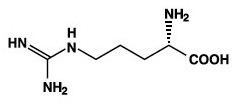L-Arginine:
Arginine is an amino acid and naturally occuring in our bodies (An amino acid is a building block, a constituent, the base unit of polypeptides and thus of proteins. There are 20 different amino acids (valine, lysine, aspartate, glutamate, glycine, tryptophan, phenylalanine and so on)). People who don't have enough L-arginine may have symptoms such as constipation, alopecia (hair loss) and skin problems. Their wounds may heal slowly, and fat may have built up in their livers [source: Mayo Clinic].
However, that is not the main reason why we use it in our formula. For skin preparations like Herbal Spray, it's important to achieve the right Ph (one that is close to your skin's natural Ph level). And during the batching process, intermediate Ph levels can affect stability or cause chemical changes. This is one of the reasons we want to be careful when combining extracts in our products. For example, it's relatively safe to combine grape seed and white tea extract in the same product, but more problematic if you were to then try to add some exfoliating ingredients. But even though we do not, the polyphenols in the White Tea, the resveratrol from the grape seed, and anti oxidants can send your formula's efficacy south if you cannot get the Ph to the right levels at each stage of the process.
L-Arginine is a typical basic amino acid with a cellular activatory effect. While more expensive than something like sodium hydroxide, and taking ten years to tweak and perfect the formula, L-arginine is very effective as a mild, natural neutralizer, and a pH adjuster, and thus removes the need to use harsh chemicals to achieve this end while potentially offering some of the health benefits associated with using an amino acid instead of a chemical. (As well, to further avoid the potential of chemical contamination from cosmetic stabilizers, we use food-grade L-Arginine in the formulas).

